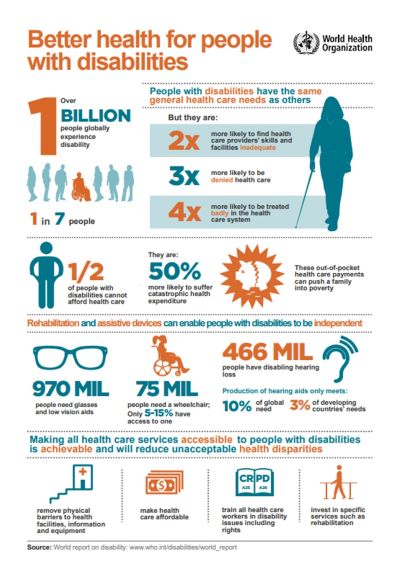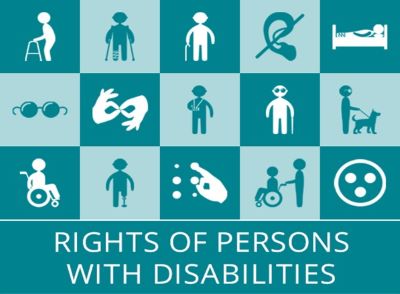Context:
Disability rights activists expect substantial financial support in the upcoming budget to address the needs of persons with disabilities to ensure their development with targeted funding for disability inclusion.
Reasonable Accommodations
The principle of reasonable accommodations (RA) is embedded in the Rights of Persons with Disabilities (RPwD) Act, 2016. According to Section 2(y) of the Act, RAs are adjustments designed to ensure that Persons with Disabilities (PwD) can exercise their rights on an equal footing with others. These accommodations can include physical modifications, such as ramps, or changes in workplace policies and job requirements. However, institutions are exempt from implementing these RAs if they can demonstrate that such measures would impose an undue or disproportionate burden on them.
Principle of ‘Reasonable Accommodation’
- The principle of ‘reasonable accommodation’ is fundamental for promoting equality and preventing discrimination based on disability, health conditions, or personal beliefs. It emphasizes the positive obligation of both the State and private entities to offer additional support to persons with disabilities. This support is essential for enabling their full and effective participation in society.
- For individuals with disabilities, the fundamental rights guaranteed by the Constitution, such as the right to equality (Article 14), the six freedoms (Article 19), and the right to life (Article 21) would be rendered meaningless without this additional support. Reasonable accommodations are necessary to make these rights tangible and applicable.
- According to Article 2 of the UN Convention on the Rights of Persons with Disabilities (UNCRPD), reasonable accommodations involve necessary and appropriate modifications and adjustments that do not impose a disproportionate or undue burden. These adjustments ensure that persons with disabilities can enjoy or exercise all human rights and fundamental freedoms on an equal basis with others.
Institutional Reluctance and Financial Considerations
Despite the Convention on the Rights of Persons with Disabilities (CRPD's) guidelines on assessing undue burden, many Indian institutions remain hesitant to bear the costs associated with implementing RAs. This reluctance is often driven by a utilitarian rather than a welfare-based approach. Institutions may view PwDs as less productive or perceive RAs as prohibitively expensive.
Consequently, the defence of undue burden is sometimes used more for expedience than genuine financial hardship, compromising the rights of PwDs and subjecting them to a cost-benefit analysis. To prevent misuse, a uniform legal standard for determining undue burden is necessary. Additionally, institutions need to recognize that investing in RAs can yield tangible business benefits beyond mere compliance.
Other Challenges in Implementing Reasonable Accommodations
- Lack of Awareness: Public understanding of disability rights and reasonable accommodations (RAs) is low, leading to societal resistance and barriers for persons with disabilities (PwDs). Many institutions also lack training on disability rights and RA implementation.
- Accessibility Issues Beyond Physical Barriers: The focus is often on physical modifications like ramps, neglecting other needs such as communication accommodations and assistive technology. Additionally, insufficiently trained staff can hinder PwD participation.
- Enforcement and Grievance Redressal: Weak enforcement of the RPwD Act and a complex grievance redressal process discourage PwDs from seeking justice. Improved monitoring and streamlined procedures are needed.
- Sustainability and Long-Term Support: Government initiatives tend to focus on one-time funding rather than ongoing support. There is a need for sustainable funding models and consistent policy focus to ensure long-term accommodation for PwDs.

Proposed Model for Addressing Reluctance
A practical model for overcoming institutional reluctance involves three key strategies:
- Sensitization and Incentives
To foster greater adoption of reasonable accommodations (RAs), the state should first sensitize institutions about the availability of inexpensive RAs. Awareness programs can highlight that many requested accommodations do not require significant financial outlay. Additionally, targeted incentives such as deductions, subsidies, or tax credits should be offered to institutions that provide RAs. These measures can encourage more institutions to integrate RAs by reducing their financial burden.
- Cost-Sharing for Institutions with Financial Hardship
For institutions facing genuine financial constraints, a cost-sharing approach should be introduced. The state can share the expenses of RAs with institutions that demonstrate actual hardship due to a lack of resources. This model helps address disadvantages and stigma faced by persons with disabilities (PwDs) while promoting their participation in various institutional ecosystems.
- Practical Implementation through the RPwD Act
This model can be practically implemented using the provisions of the Rights of Persons with Disabilities (RPwD) Act. Section 86 of the Act provides for the creation of a National Fund for PwDs, which includes contributions from banks and financial institutions as mandated by the Supreme Court of India in Indian Banks’ Association, Bombay vs M/s Devkala Consultancy Service. Rule 42 of the RPwD Rules, 2017, stipulates that the fund’s corpus be used to fulfill the Act's objectives.
Constitutional Obligations and Positive Ecosystems
Constitutional Obligations
The Constitution of India obligates the state to create conditions that enable individuals to exercise their right to equality effectively. This includes ensuring that institutions are accessible to PwDs. The state must foster an environment where institutions not only meet legal requirements but also embrace the benefits of accommodating PwDs.
Ensuring a Welfare Approach
When institutions request RAs, they should first assess their resource constraints in light of any incentives already provided. Institutions can then submit a request to the National Fund for compensation of any shortfall. The National Fund’s governing body should evaluate the request based on factors such as the institution's overall financial resources, access to external funding, and availability of less expensive alternatives. This process should be guided by a welfare rather than a utilitarian approach, ensuring that the proportionality of requested RAs is fairly assessed.
Conclusion
The proposed Incentive and Cost-Sharing Model aims to achieve multiple objectives: reducing institutional reluctance to accommodate PwDs, providing positive outcomes for new and emerging institutions, and ensuring a uniform legal standard for undue burden. By addressing these issues, the model supports a more inclusive and equitable approach to accommodating persons with disabilities.
|
Probable Questions for UPSC Mains
|
Source: The Hindu







